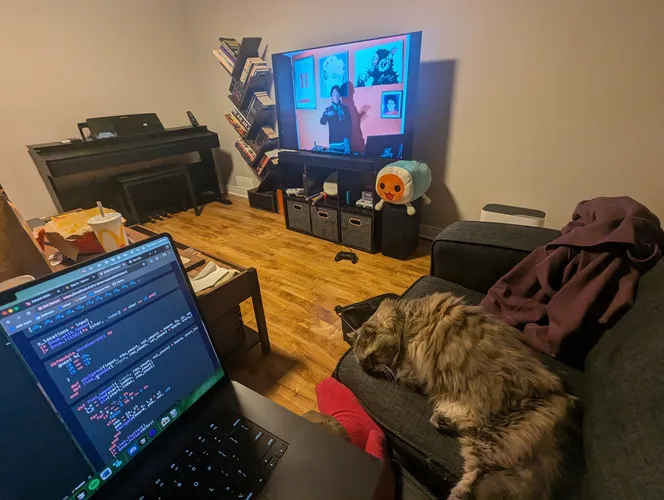day 4
it comes every year, and yet, who is ever fully prepared…
(im sure some are but i always have to remember again how to do grid shenanigans)
its grid time baby
many different ways to approach representing a grid, and also what operations are available on grids if people have busy standard libaries / reach for numpy (curious to see arafat this time around…)
time to do some word searchin’
click to view my solution
given the sample input:
MMMSXXMASM
MSAMXMSMSA
AMXSXMAAMM
MSAMASMSMX
XMASAMXAMM
XXAMMXXAMA
SMSMSASXSS
SAXAMASAAA
MAMMMXMMMM
MXMXAXMASXassuming input is the above as one big string,
rows = String.split(input, "\n")
row_count = length(rows)
col_count = Enum.at(rows, 0) |> String.length()
input = input
|> String.replace("\n", "")
|> String.graphemes()
|> Enum.map(&(String.to_atom(&1)))breakup the rows, get the length, then get the column length
im pretty sure the input is always a prefect n x n grid, but oh well
then, replace the newlines in the input with empty string, map over the graphemes, which will give us each thing as a single string thats a single character, then map over the characters and turn them into elixir symbols
[:M, :M, :M, :S, :X, :X, :M, :A, :S, :M, :M, ..we get a flat list of symbols to work with
my intent is to do integer div / mod operators to go from grid position to index, and index to grid position
part 1
x_locations = input
|> Enum.with_index()
|> Enum.filter(fn {char, _index} -> char == :X end)first, we find each x position, and use Enum.with_index to get its index in the list
defmodule WordSearchV1 do
@next %{
:X => :M,
:M => :A,
:A => :S
}
def navigate({input, row_count, col_count} = board, {x, y}, vec, expecting) do ..
def find_xmases({_input, row_count, col_count} = board, start_index) do ..
endthe code for this is a bit chunkier than before, for part 1 i pull out this
module WordSearchV1, that has a mapping from character to the expected next character,
find_xmases/1 is the entrypoint, and navigate/1 is the recursive function
that will keep navigating through the grid (i call it board in the code) until it either
- gets through an entire
[:X, :M, :A, :S]section of values - gets through partially but then sees a value it does not expect
- gets out of bounds
def find_xmases({_input, row_count, col_count} = board, start_index) do
i_x = rem(start_index, col_count)
i_y = div(start_index, row_count)
for x <- -1..1 do
for y <- -1..1 do
if x == 0 && y == 0 do
false
else
vec = {x, y}
pos = {i_x + x, i_y + y}
navigate(board, pos, vec, :M)
end
end
end
|> List.flatten()
|> Enum.filter(&(&1))
endfind_xmases/1 takes in the input :X point, and does some Range magic
to get a vector for each position around the center point, and starts
running navigate from that position, with that movement vector, and expects the next
value it sees to be :M, the value after the :X we know we already have
we expect navigate to return a boolean depending on if it was a valid xmas or not,
and we flatten the return value from the navigate calls, and filter out any non true values
before returning it to the caller
def navigate({input, row_count, col_count} = board, {x, y}, vec, expecting) do
if (x < 0 or x > row_count) or (y < 0 or y > col_count) do
false
else
index = row_count * y + x
val = Enum.at(input, index)
if val == expecting do
if val == :S do
true
else
{x_mod, y_mod} = vec
pos = {x + x_mod, y + y_mod}
navigate(board, pos, vec, Map.fetch!(@next, expecting))
end
else
false
end
end
endthen, in navigate:
- we do the out of bounds check, false if thats hit
- then, we do the math to go from
{x, y}vector to index in flat list, get the value, and expect that value to be the next value in the map- if that is the case, we go to the next position via a recursive call to navigate, using the
@nextmap to get the next value that iteration should check for - if not, we return false
- if that is the case, we go to the next position via a recursive call to navigate, using the
for {_x, x_location} <- x_locations do
WordSearchV1.find_xmases({input, row_count, col_count}, x_location)
end
|> List.flatten()
|> Enum.count()making use of WordSearchV1, we call it for each x_location, and get back all of the lists of true,
we flatten that list of lists of true, and count how many trues we have
and we get the answer!
part 2
a_locations = input
|> Enum.with_index()
|> Enum.filter(fn {char, _index} -> char == :A end)same as x_locations, but this time, a
defmodule WordSearchV2 do
def get_value_from_pos({input, row_count, col_count}, x, y) do ..
def find_x_mases({_input, row_count, col_count} = board, center) do ..
endno need to pull our recursion this time, but we need a new WordSearch, so we make new WordSearchV2 here
def find_x_mases({_input, row_count, col_count} = board, center) do
c_x = rem(center, col_count)
c_y = div(center, row_count)
if c_x - 1 < 0 or c_x + 1 > col_count or c_y - 1 < 0 or c_y + 1 > row_count do
false
else
top_left = get_value_from_pos(board, c_x - 1, c_y - 1)
top_right = get_value_from_pos(board, c_x + 1, c_y - 1)
bottom_left = get_value_from_pos(board, c_x - 1, c_y + 1)
bottom_right = get_value_from_pos(board, c_x + 1, c_y + 1)
left_pair = case {top_left, bottom_right} do
{:M, :S} -> true
{:S, :M} -> true
_ -> false
end
right_pair = case {top_right, bottom_left} do
{:M, :S} -> true
{:S, :M} -> true
_ -> false
end
is_valid = left_pair and right_pair
is_valid
end
endlook at each value around the :A, and check to see if either the top left / bottom right, or bottom left / top right are the right tuple either forwards or backwards
and then if both pairs are valid, we have a valid x-mas!
def get_value_from_pos({input, row_count, col_count}, x, y) do
if x < 0 or x >= col_count or y < 0 or y >= row_count do
nil
else
index = row_count * y + x
Enum.at(input, index)
end
endjust a util function to go from {x, y} vector to value, and if its out of bounds, just return nil
for some questions wraparound is needed, and this method makes wraparound easy, but here i have to actively fight against wrap around with all of these bounds checks… oh well
for {_x, a_location} <- a_locations do
WordSearchV2.find_x_mases({input, row_count, col_count}, a_location)
end
|> List.flatten()
|> Enum.filter(&(&1))
|> Enum.count()same as before, flatten them lists of booleans, then only get true ones, then count ‘em
nice
the full solution can be found [here]
others
[Mudkip/AdventOfCode] elixir[DanielPower/AdventOfCode] rustsimilar flat list extract via some lookups solution!
going through each position in the grid regardless of if it starts with a known valid value for both cases, also making it dynamic to find any string, nice, truly a generic word searcher out here
@directionscould be calculated viaRange:), but very easy to just write out the vectors around a point rather than do thatwoah! broke out a utility file for doing grid operations! fancy!
no recursion in search word, just doing some cool stuff with
extract_line, that utility seems nicei should get on this train, every single time i get hit with a grid question (as mentioned in the preamble), i reinvent the wheel
you’re simply a better man mudkip
[ncashin/aoc2024] elixir
impl Gridtime!, woah, very tidy yet again danstruct Grid { items: Vec<char>, width: usize, height: usize, } impl Grid { fn from_reader<R: Read>(reader: R) -> Self { ... } fn get(&self, x: usize, y: usize) -> Option<char> { ... } fn rows(&self) -> impl Iterator<Item = Vec<char>> + '_ { ... } fn cols(&self) -> impl Iterator<Item = Vec<char>> + '_ { ... } fn diags(&self) -> impl Iterator<Item = Vec<char>> + '_ { ... } }a really nice set of utils / data structure
fn main() { let grid = Grid::from_reader(std::io::stdin()); let mut total = 0; for chars in grid.rows().chain(grid.cols()).chain(grid.diags()) { let string = String::from_iter(chars); total += string.matches("XMAS").count() + string.matches("SAMX").count(); } println!("{}", total); }leading to a nice and tidy
main, that creates aGridstruct straight from stdin,iterates over the rows / cols / diags using [
.chain], so you get one bit iterator with all of the chars in different directions,and then, just getting the matches of
XMAS, orSAMX, in said strings representing cols / rows / diagsits a long one, but its honestly a great one
good job dan
part 2 is less busy and more direct, but honestly it makes sense, no need for all the busy grid utils that time around, other than
get
[hkings google sheets] sheetsmore natalie elixir lets go
some tidy util functions here!
could do with some more newlines at spots to increase readability, but overall, looking good
def find_mas_x(map, x, y) do if map[y][x] == "A" && ((map[y - 1][x - 1] == "S" && map[y + 1][x + 1] == "M") || (map[y - 1][x - 1] == "M" && map[y + 1][x + 1] == "S")) && ((map[y - 1][x + 1] == "S" && map[y + 1][x - 1] == "M") || (map[y - 1][x + 1] == "M" && map[y + 1][x - 1] == "S")) do 1 else 0 end endthis is some busy code, but a clever way of getting them
x_masesbut your function name feels backwards,
mas_x?, the question clearly statesx_mastsk tsk natalie
[nint8835/advent-of-code] f#i see a day 4 section in your sheet, and i see some work started in it
but, if i’m not mistaken, there is no solution here…
pour one out
he is no longer getting away with this
[GirishVerm/aoc2024] pythonriley seems back at it again pulling out some f# party tricks, oh my
let checkRange (xCoords: int[]) (yCoords: int[]) (rangeSelector: int -> int -> (int * int) * (int * int)) (requiredStr: string) : (int * int)[] = xCoords |> Array.map (fun x -> yCoords |> Array.filter (fun y -> let value = inputData |> (rangeSelector x y ||> Array2D.range) |> String.concat "" (value = requiredStr) || (value = (String.reverse requiredStr))) |> Array.map (fun y -> (x, y))) |> Array.concatso it seems your entire solution leans heavily on this busy busy busy function
the definition syntax is weird but i assume each one of these newlines is just a named argument with a type next to it
and basically, you’re doing some nonsense
nonsense i do not have the time to dig into, but i can tell by what you are doing with these functions, does the job
cursed as usual, thank you riley
[terales/advent-of-code] pythonhello girish! welcome to the rambles, glad you could join us
here, take some tea from the teapot 🫖, make yourself comfy, stay a while…
your part 1, is verbose, but also, it is simple
could probably make it more generic if you looked at each conditional statement and figured out how you could express it as a function and then call that function for each time you are currently breaking out into an
if/ifpart 2, however, is nice and smol
and you are here, out here, with the two stars
hope you enjoyed the tea, until next time
[djrideout/advent2024] rustalex pulling out numpy today! nice to see
d4c1: solved with numpy magic
great commit message
and tidy part 2
nice
[ericthomasca/adventofcode2024] golangdj also out here making a grid util! cool!
also needing to reach for
Arcfor aoc? interestingi thought this was similar to dans, but it doesn’t seem like so!
aspects of this feel like mine, in which you calculate all of the movement vectors from an initial position
a bit busy in parts, i feel like maybe the
Box/Arcstuff could be avoided? but maybe not due to the way things are structurednice
[STollenaar/AdventOfCode] golangsome verbose golang, similar comment to girish on some of this could be util function’d
but, stars 1 & 2… no need to fix it, if both stars 1 & 2!
[mwln/aoc] luanice util function usage! aspects of this seem verbose, but def. much less total character count than other solutions
good job sven
[ThatGravyBoat/Advent-of-Code-2024] rustvery tidy, quite compact, lua from the good ol’ mert
offsetsfor the diags are clean, with the lilhits_targetfunctionno
gotothis time around, lets go
[omega7379/Advent-of-Code] pythonno utils here, other rust folks went busy with them, but good ol gravy out here util-less
i have less and less to say than what has already been said, yet again!
seems like most people have the same idea, just differences in where they start from finding specific items, approaching things from breaking them apart into diags first, or just looking aroundt he central point for the string they are looking for
this one is tidy, not many notes
ya
[ShevinuM/Advent-of-Code-2024] golanga basically empty file, with the commit message:
did not finish
neiro out, good staying w/us this far, godspeed on becoming a CIDR block pro 🖖
[evaan/AdventOfCode] golang
copy paste the response send to eric here:Dpart 2 is nice and compact though
nice
[GreyGrisGrey] python
[M-ArafatZaman/advent-of-code-2024] python[10:41 PM] Grey: oh god i just remembered my day 4 solution
[10:41 PM] Grey: local man asked to never code again
not too bad here grey! :D
some actual util functions vs. just writing all the conditionals here is nice
maybe don’t have lines be super long, be ok with more of a line count if it means your code doesn’t gain a horizontal scrollbar :)
tidy
[mynameisgump/advent-of-code] pythonand here’s arafat!
from numpy.lib.stride_tricks import sliding_window_viewwha- what is this import?
digging deep into numpy for this
honestly with all the tricks i sortof expected this to be a few lines less, but still, very tidy
also pulling out regex for
XMAS, to getre.findall, nice
a long day 4, but it seems you weren’t the only one with a long day 4
ethan code ethan code ethan code
a pretty nice intro grid question, good job everyone :)
did this, still at dans, next to maria, listening to japanese city pop
time to go to bed soon, not going to get to day 5 today, for it is technically monday, and i do technically have work in a few hours from now
and
sleep is good

just look at maria, she sure knows how to sleep
any thoughts about any of the above?
reach out:
